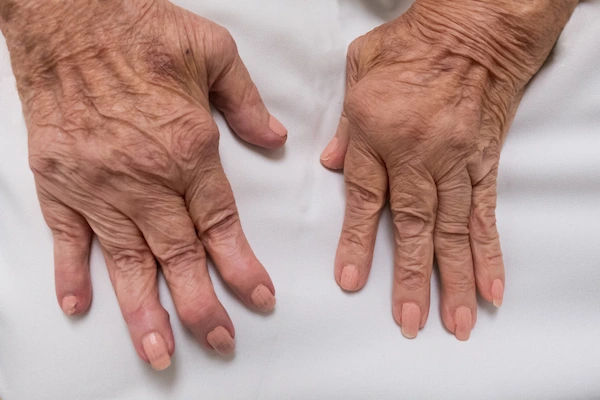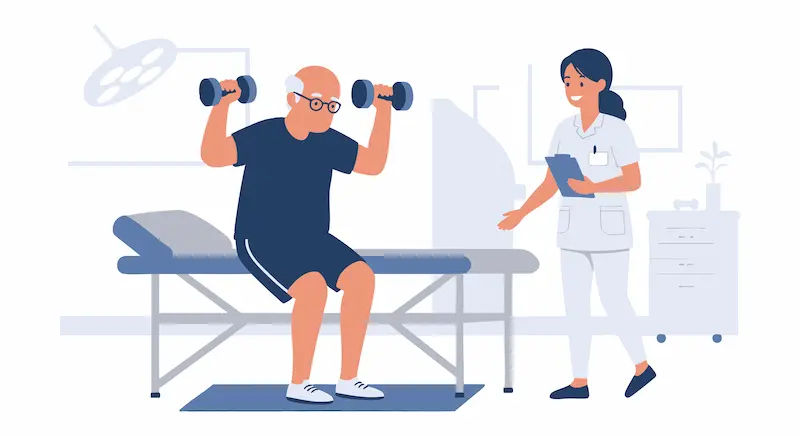What Leads To Inflammatory Arthritis Types And Diagnosis?
Learn what leads to inflammatory arthritis, including key risk factors and common types such as rheumatoid arthritis and psoriatic arthritis. Understand the diagnosis process and when to seek medical advice.


Imagine waking up every morning with stiff, swollen, and painful joints. This isn't just everyday wear and tear; it's a sign that your body's defense system may be mistakenly attacking its own tissues. This is the reality for millions living with inflammatory arthritis, an umbrella term for a group of autoimmune and autoinflammatory diseases. Unlike the more common osteoarthritis, which results from mechanical degeneration, inflammatory arthritis is driven by internal inflammation that can damage joints and even affect other organs like the skin, eyes, and heart. This article will serve as your comprehensive guide, demystifying what triggers these conditions, exploring the different types of inflammatory arthritis, and breaking down the diagnostic process. Understanding these facets is the first crucial step toward effective management and reclaiming your quality of life.
What Exactly is Inflammatory Arthritis?
At its core, inflammatory arthritis is a category of diseases characterized by inflammation of the joints and surrounding tissues. This inflammation is not a response to an injury or infection in the usual sense. Instead, it's a case of mistaken identity. The body's immune system, which is designed to protect against foreign invaders like viruses and bacteria, goes haywire and launches an attack on the synovium—the soft tissue lining the joints that produces fluid to lubricate and nourish the cartilage.
This sustained attack causes the synovium to thicken, leading to pain, swelling, redness, and warmth in the affected joints. Over time, the inflamed synovium can invade and damage the cartilage and bone within the joint, leading to erosion, loss of movement, and deformities. The inflammation isn't always contained; it can spill into the bloodstream, causing systemic symptoms like fatigue, fever, and a general feeling of being unwell, and can impact other organ systems.
What Triggers the Immune System?
The exact causes of inflammatory arthritis remain a subject of intense research, but it is widely believed to result from a combination of genetic predisposition and environmental triggers—a concept often called the "double-hit" theory.
- Genetic Factors: Certain genes can make you more susceptible to developing autoimmune arthritis. For example, the HLA-B27 gene is strongly associated with ankylosing spondylitis, while specific variants of the HLA-DRB1 gene are linked to Rheumatoid Arthritis. However, having these genes doesn't guarantee you'll develop the disease; it merely increases your risk.
- Environmental Triggers: For a genetically predisposed person, an external factor can act as a trigger to kickstart the disease. Common triggers for autoimmune arthritis include:
- Infections: Bacterial or viral infections (e.g., Epstein-Barr virus, periodontal disease) may confuse the immune system, leading it to attack the joints.
- Smoking: This is one of the most well-established risk factors, particularly for RA.
- Hormonal Changes: The higher prevalence in women suggests hormones like estrogen may play a role.
- Stress: Chronic physical or emotional stress can dysregulate the immune system.
- Obesity: Fat cells (adipocytes) produce inflammatory proteins that can exacerbate or contribute to systemic inflammation.
Common Types of Inflammatory Arthritis
Understanding the different types of inflammatory arthritis is crucial, as each has unique characteristics and treatment approaches.
- Rheumatoid Arthritis (RA): RA is the most common type of autoimmune arthritis. It's a systemic disease characterized by symmetric synovitis—meaning it typically affects the same joints on both sides of the body (e.g., both wrists, both knees). It often starts in the smaller joints of the hands and feet. Untreated, it can lead to severe joint deformities.
- Psoriatic Arthritis (PsA): PsA occurs in some people with the skin condition psoriasis. It can affect any joint in an asymmetric pattern and is known for causing enthesitis (inflammation where tendons/ligaments attach to bone) and dactylitis ("sausage digits"—swollen entire fingers or toes). Nail changes like pitting are also common.
- Ankylosing Spondylitis (AS): AS primarily affects the axial skeleton—the spine and sacroiliac joints in the pelvis. It causes inflammatory back pain that is often worse in the morning or after inactivity. In severe cases, it can lead to the fusion of vertebrae, resulting in a loss of spinal mobility.
- Gout and Pseudogout: These are crystalline arthropathies, caused by the deposition of tiny crystals in a joint. Gout is caused by uric acid crystals and often presents with sudden, excruciating pain, commonly in the big toe. Pseudogout is caused by calcium pyrophosphate crystals and often affects the knee or wrist.
- Juvenile Idiopathic Arthritis (JIA): JIA is an umbrella term for inflammatory arthritis that begins before the age of 16. It has several subtypes and can cause growth problems and eye inflammation (uveitis) in children.
Consult Top Specialists
How is Inflammatory Arthritis Diagnosed?
There is no single test for inflammatory arthritis. Diagnosing inflammatory arthritis is a detective-like process that involves piecing together clues from several sources. If your symptoms persist beyond two weeks, it is vital to consult a doctor for a proper inflammatory arthritis diagnosis.
1. Medical History and Physical Exam: Your doctor will ask about your symptoms (e.g., morning stiffness duration, pattern of joint involvement), family history, and overall health. They will physically examine your joints for swelling, warmth, tenderness, and range of motion.
2. Blood Tests: These look for markers of inflammation and autoimmune activity.
- Inflammatory Markers: Erythrocyte Sedimentation Rate (ESR) and C-Reactive Protein (CRP) are often elevated.
- Rheumatoid Factor (RF) and Anti-CCP: These antibodies are commonly found in RA (Anti-CCP is more specific).
- HLA-B27: A genetic marker associated with AS and other spondyloarthropathies.
- Uric Acid: Elevated levels can suggest gout.
Apollo24|7 offers convenient home collection for these tests, making the diagnostic process smoother.
3. Imaging Tests: These help visualize damage and inflammation.
- X-rays: Can show joint damage, bone erosions, and cartilage loss, but often only in later stages.
- Ultrasound: Excellent for detecting inflammation in the synovium and tendons in real-time.
- Magnetic Resonance Imaging (MRI): The most sensitive test for detecting early inflammatory changes, bone edema (fluid), and erosions before they appear on an X-ray.
Why Seeking Early Medical Advice is Crucial?
The "window of opportunity" is a critical concept in rheumatology. Early diagnosis and aggressive treatment within the first few months of symptom onset can dramatically alter the disease's long-term course. It can slow or even stop disease progression, prevent irreversible joint damage and disability, and help you maintain your function and quality of life. If your condition does not improve after trying over-the-counter pain relievers, book a physical visit to a doctor or rheumatologist with Apollo24|7 for further evaluation.
Conclusion
Inflammatory arthritis is a complex journey, but it's not one you have to navigate alone or without hope. By understanding its causes, recognizing the different types, and appreciating the importance of a thorough diagnostic process, you are empowered to take the next step. Remember, these conditions are highly manageable with today's advanced treatments. Persistent joint pain, especially when accompanied by morning stiffness and systemic symptoms like fatigue, is not something to ignore or dismiss as simple aging. It is your body sending a signal. Listening to that signal and seeking expert medical advice promptly is the most powerful action you can take to protect your joints and your overall well-being for years to come.
Consult Top Specialists
Consult Top Specialists

Dr. Zulkarnain
General Physician
2 Years • MBBS, PGDM, FFM
Bengaluru
PRESTIGE SHANTHINIKETAN - SOCIETY CLINIC, Bengaluru

Dr. Gautam Dhar Choudhury
Rheumatologist
18 Years • MBBS MD (Internal Medicine) Fellowship in Rheumatology ( SGPGI Lucknow) FICP
Kolkata
Apollo Multispeciality Hospitals , Kolkata, Kolkata
(100+ Patients)

Dr. Sundeep Kumar Upadhyaya
Rheumatologist
30 Years • MBBS, MD, DM
Delhi
Apollo Hospitals Indraprastha, Delhi
(225+ Patients)
Dr. Juhi Dixit
Rheumatologist
8 Years • MBBS, MD (General Medicine), DNB (General Medicine), DM (Clinical Immunology & Rheumatology)
Raipur
Apollo Sugar Clinics, Raipur, Raipur

Dr. Anand Ravi
General Physician
2 Years • MBBS
Bengaluru
PRESTIGE SHANTHINIKETAN - SOCIETY CLINIC, Bengaluru
Consult Top Specialists

Dr. Zulkarnain
General Physician
2 Years • MBBS, PGDM, FFM
Bengaluru
PRESTIGE SHANTHINIKETAN - SOCIETY CLINIC, Bengaluru

Dr. Gautam Dhar Choudhury
Rheumatologist
18 Years • MBBS MD (Internal Medicine) Fellowship in Rheumatology ( SGPGI Lucknow) FICP
Kolkata
Apollo Multispeciality Hospitals , Kolkata, Kolkata
(100+ Patients)

Dr. Sundeep Kumar Upadhyaya
Rheumatologist
30 Years • MBBS, MD, DM
Delhi
Apollo Hospitals Indraprastha, Delhi
(225+ Patients)
Dr. Juhi Dixit
Rheumatologist
8 Years • MBBS, MD (General Medicine), DNB (General Medicine), DM (Clinical Immunology & Rheumatology)
Raipur
Apollo Sugar Clinics, Raipur, Raipur

Dr. Anand Ravi
General Physician
2 Years • MBBS
Bengaluru
PRESTIGE SHANTHINIKETAN - SOCIETY CLINIC, Bengaluru
More articles from Arthritis
Frequently Asked Questions
What are the first signs of inflammatory arthritis?
The earliest signs often include persistent joint pain and tenderness, swelling in one or more joints, prolonged morning stiffness (lasting more than 30 minutes), and reduced range of motion. Systemic symptoms like unexplained fatigue and low-grade fever can also be early indicators.
Can inflammatory arthritis be cured?
Currently, there is no cure for most types of chronic inflammatory arthritis like RA or AS. However, they are highly manageable conditions. With modern treatment strategies, the goal is to achieve clinical remission—a state where symptoms are minimal or absent, and disease progression is halted.
What is the difference between inflammatory arthritis and osteoarthritis?
The key difference is the cause. Osteoarthritis is a 'wear-and-tear' degenerative disease where cartilage breaks down from mechanical stress. Inflammatory arthritis is an autoimmune disease where the body's immune system attacks the joints, causing inflammation, and it often affects multiple joints symmetrically.
Are there any specific risk factors for developing rheumatoid arthritis?
Yes, key risk factors include being female (women are 2-3 times more likely to develop RA), having a family history of RA, smoking cigarettes, and being obese. Age is also a factor, with onset most common in middle age.
Can diet influence inflammatory arthritis symptoms?
While no diet can cure inflammatory arthritis, an anti-inflammatory diet may help manage symptoms and reduce systemic inflammation for some people. This typically involves eating more omega-3 fatty acids (found in fish), fruits, vegetables, and whole grains, while reducing processed foods, sugar, and saturated fats.




